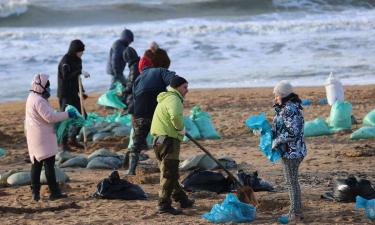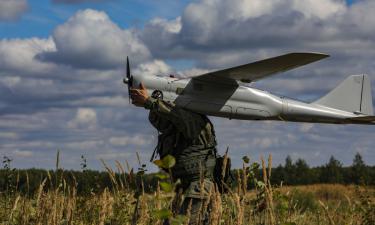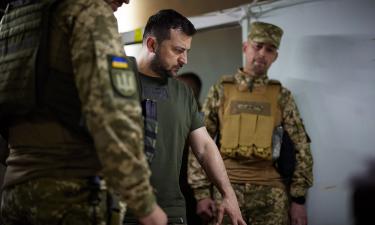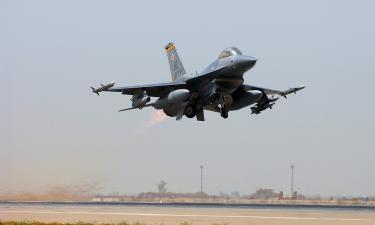Georgia's "rose revolution" was not democratic change of power
"Georgia's "rose revolution" was not a democratic change of power," Russian Security Council Secretary Igor Ivanov told reporters on Tuesday when asked to comment on Russian-Georgian relations.
"If you ask me how the government overturn took place in Georgia and later on in Adjaria (Georgia's autonomy), I will say it was not a velvet or a rose revolution. That was a take-over. This is what I said at a meeting of foreign ministers in Maastricht," said Mr Ivanov.
The way the Georgian government was overthrown cannot satisfy those who maintain democratic values, according to Mr Ivanov.
"We must not applaud to such changes in any country if we seek democracy. All changes should be made in line with the constitution. Changing power through street rallies is not a democratic method," said Mr Ivanov.
Mr Ivanov believes it was largely Russia that prevented bloodshed in Georgia and Adjaria.
Mr Ivanov did not agree with the opinion that Russia has in fact lost a sphere of its interests in the region because of the aggravation of Georgian-Adjarian relations.
"Adjaria was seen as a Russian exclave in Georgia. This was not true. Adjaria had never considered disintegrating from Georgia, while Russia has never claimed Georgia's territorial integrity," emphasised Mr Ivanov.
Mr Ivanov believes developments in Adjaria are an internal problem of the Georgian and Adjarian authorities.
The minister said two Russian military bases in Georgia (in Batumi and Akhalkalaki) were not engaged in political processes there.
He also recalled Georgian President Mikhail Saakashvili's statement that the Russian base had maintained neutrality during the Adjaria conflict.
Mr Ivanov therefore believes that processes under way between Adjaria and Georgia are not linked to relations between Russia and Georgia.
"The opinion that the recent developments show that Russia has lost much of its influence /in Georgia/ isnot grounded," said Mr Ivanov.
The Russian official believes bilateral relations were aggravated above all by the Georgian authorities' connivance at terrorists residing on Georgian territory. That was Mr Ivanov's answer to a question about a negative impact of Georgia's pro-American position.
Bilateral relations aggravated under ex-president Shevardnadze "not because he pursued a pro-American policy, but over terrorists that infiltrated Russia from Georgian territory en masse and committed crimes on Russian soil," emphasised Mr Ivanov.
Mr Ivanov noted that the incumbent Georgian leader also believed that president Shevardnadze had made a mistake by hushing up the fact that Georgia's Pankisi Gorge sheltered terrorists. (Pankisi that is located near the Chechen section of the Russian-Georgian border was home to forced migrants from Chechnya. A lot of militants were hiding among them.)
"A /newspaper/ report said recently that Georgia's Interior Ministry would open criminal cases against those who had helped Gelayev's gangs move from Pankisi to the Kodori Gorge," said Mr Ivanov. (Kodori is located within the Georgia-Abkhazia conflict zone. Abkhazia is a self-proclaimed republic on Georgian territory. Chechen militants moved to Kodori to fight on Abkhazia's side.)
"Political orientation is every country's internal affair after all. Our problems with Shevardnadze were above all over his attitude to terrorists in Pankisi," said Mr Ivanov.
The Russian Security Council secretary said American military experts' presence in Georgia did not worry Moscow much. "They are training Georgian commandos to deal with terrorists. This is Georgia's choice. We recognise its sovereignty and independence," said Mr Ivanov.
However, Russia is like any country pursuing its interests, added Mr Ivanov.
"We are guided by national interests. When a certain country's policy clashes with our interests, we protect our interests," emphasised Mr Ivanov.
When asked what Russia would do in the event of a conflict between Georgia and South Ossetia (another self-proclaimed republic on Georgian territory), Mr Ivanov said - "There are arrangements of multilateral consultations between Russia, Georgia and South Ossetia. There is also a peacekeeping contingent."
Mr Ivanov believes it is necessary to deter the use of force. "All issues must be settled through talks," he said. Mr Ivanov added that President Saakashvili had promised to adhere to political means of resolving problems.
Mr Ivanov said ex-Georgian president Gamsakhurdia had unfortunately used force against South Ossetia. "We know this only aggravated the problem, claimed the lives of many people and ousted many from the republic," recalled Mr Ivanov.
Mr Ivanov believes if the Georgian government chooses to repeat that experience, it will complicate its plans to bring stability and normality to the country.
"Georgia is living through hard times economically and politically. Russia has considerable influence in Georgia (it is home to close on 600,000 Georgian nationals) and it is ready to provide assistance to the republic via dialogue," said Mr Ivanov.
Subscribe to Pravda.Ru Telegram channel, Facebook, RSS!





